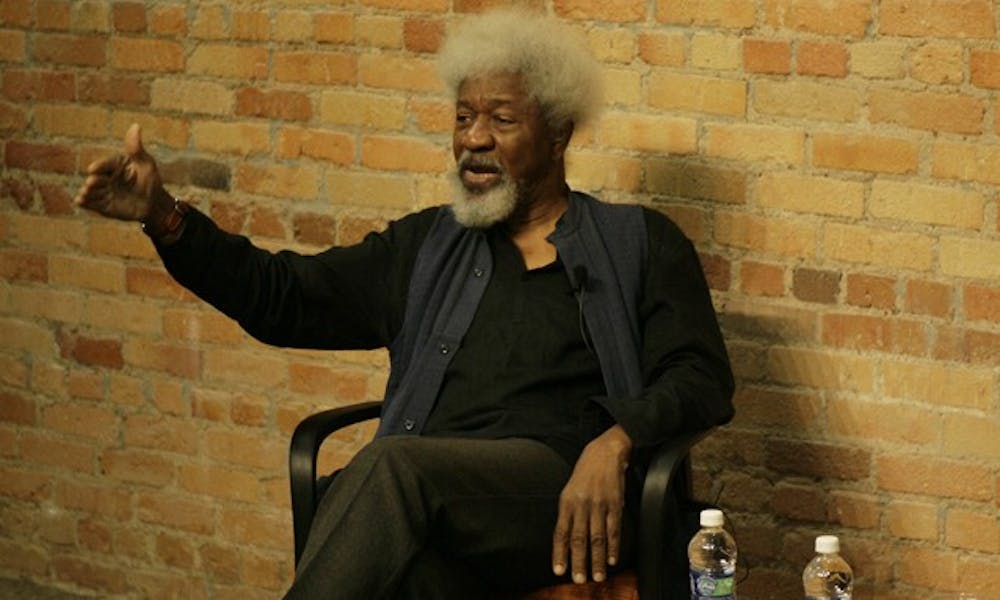Nobel laureate Wole Soyinka spoke Friday about the background behind his play “The Beatification of Area Boy: A Lagosian Kaleidoscope.”
The Nigerian human rights activist and former Franklin Humanities Institute distinguished scholar in residence discussed urban ruin in Lagos, Nigeria with an audience of about 30 people at Smith Warehouse Oct. 22. He was invited by Franklin Humanities Institute in partnership with the Department of Theater Studies for an event titled “Mega-Cities/Mega-Slums: Urban Ruin and Renewal on the Global Stage.”
“The Beatification of Area Boy” presents a kaleidoscopic view of Lagos, a poverty-stricken city projected to become one of the world’s largest cities in the coming decade. Set after after the 1990s oil boom during the displacement of Nigerian poor by the corrupt government, the play follows a Lagos street gangster, Sanda, who acts as a modern-day Robin Hood and is the leader of the local area boys.
In his talk Friday, Soyinka described the destruction of historic colonial structures in Lagos following Nigerian independence from the United Kingdom in 1960 as his “first mature encounter with the mindlessness that goes with urban renewal.” He cited the example of the old supreme court building, which was torn down to build a fountain, commemorating Nigerian independence from which “water never flowed.”
He said urban renewal allowed the young nation to present a false notion of prestige at the cost of seeing humans merely as obstacles to profit.
“The humanity—which occupies the land—has a second place where profit is concerned,” Soyinka said.
Such was the case for Maroko, the slum in the play, which was destroyed overnight to make room for new development, displacing more than a million people. The destruction, though, brought many people together. Soyinka mentioned that the initial rescue operation was carried out by expatriates, whom many of the residents of Maroko worked for.
At the same time, Soyinka said there is great danger in romanticizing what should be unacceptable. Even though there is something very heroic about people who live with very little, idealizing this only removes social responsibility, he added.
Soyinka’s speech coincided with the Department of Theater Studies’ production of his play, which premiered Thursday, Oct. 21 and is running through Oct. 31 in Reynolds Theater.
Specific to Duke’s production, projections of Detroit were shown in the background to place “the audience in their own reality,” he said.
The play has been performed in several cities across the world, but for Soyinka the most meaningful adaptation he directed was in Kingston, Jamaica. He called the adaptation an instrument for reviving a stressed area of the city.
Because the play was performed in a theater in the Kingston slums, the actors were not immune to urban violence and two of the actors were killed by gunfire outside the theater. Additionally, child actors often had to spend the night in the theater because it was too dangerous for them to return home.
“What goes on in Lagos is child’s play compared to Kingston, Jamaica,” Soyinka said.
Although the concept of “area boys” is universal, there are cultural differences ranging from country to country. Soyinka defined area boys as petty criminals that abide to strict rules; some are not allowed to get drunk or smoke marihuana, for example. Contrary to gangs in the United States, area boys have a stronger sense of attachment to their land.
“Professor Soyinka has a large world view [and is] very well-travelled, which provides an integrative view to explain his thoughts to the audience,” said Ami Shah, lecturing fellow in the Thompson Writing Program.
Shah called the presentation fantastic, saying it was descriptive of Nigeria but also dealt with issues affecting Duke.
“I had never heard about Nigeria or the concept of area boys,” said Erica Salvador, an intern at the Franklin Humanities Institute. “I was quite astonished by the explanation and whole concept.”
Get The Chronicle straight to your inbox
Sign up for our weekly newsletter. Cancel at any time.

